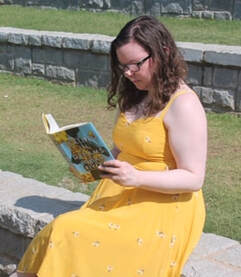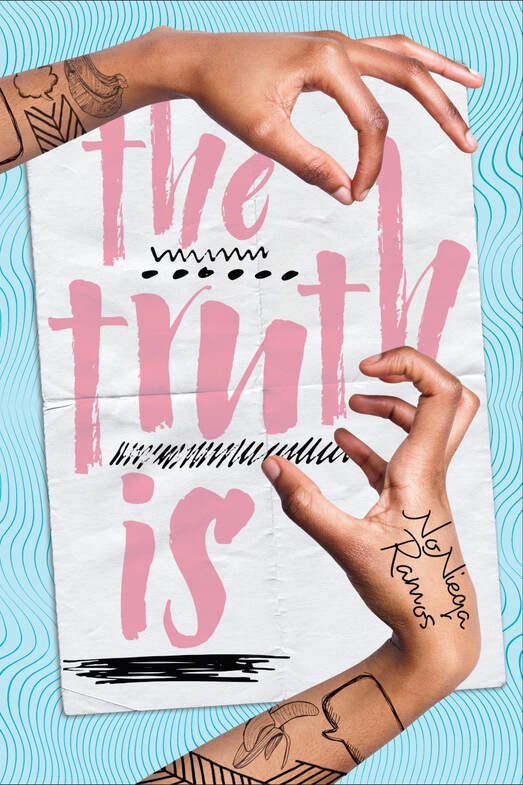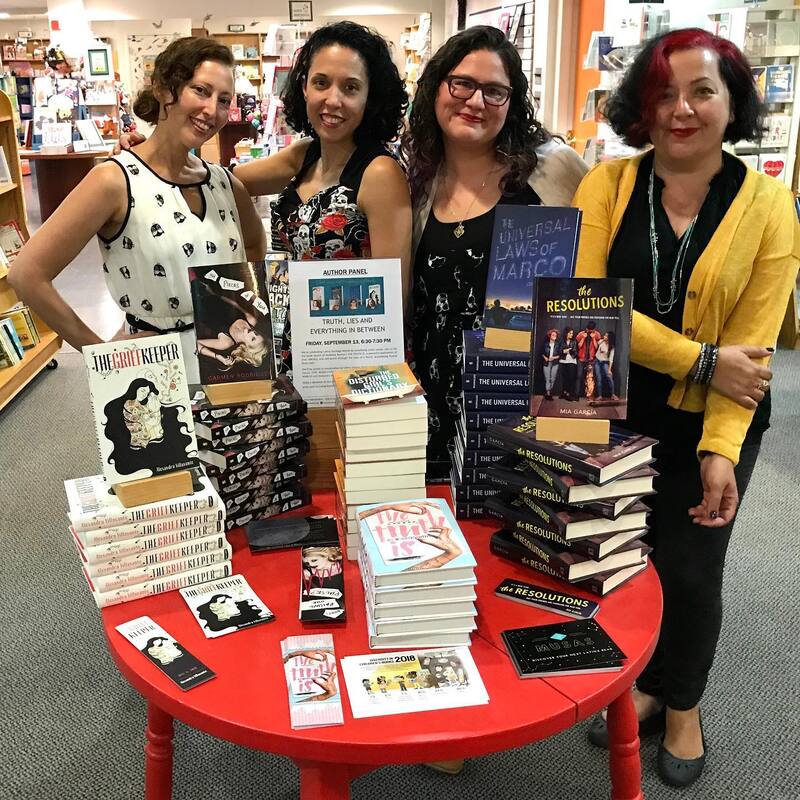|
Today, it’s my pleasure to be in conversation with NoNieqa Ramos about her sophomore novel, The Truth Is. The author of The Disturbed Girl’s Dictionary is back with an intense novel that explores identity, grief, prejudice, and so much more. The Truth Is by NoNieqa Ramos stars Verdad, a fifteen-year-old girl with a lot on her plate. She lost her best friend in a very traumatic way and isn’t sure how to process it. She has a mother that loves her, but her love doesn’t come easy. Her father spends far more time with his step-daughter than he does with her. On top of it all, a new boy in school has caught her attention. A very cute trans boy. An incident with a classmate and her relationship with Danny are catalysts for change in Verdad’s life. She begins to question everything she knows about herself and the world. She questions her sexuality, how she views gender, her Boricua identity, and all the beliefs that have been ingrained in her. The truth is, Verdad has a lot to figure out. Thank you for speaking with me, NoNieqa. Without further ado, let’s get started! There are many times in which Verdad puts her foot in her mouth, realizing she has a lot to learn about others. What do you want readers her age to take from these scenes? We are living in a dystopia. Colonizers robbed indigenous people of this nation and now the forces of white supremacy cage them on the border. The school-to-prison pipeline is modern society’s underground plantation. Migrants are making our clothes, growing and packaging our food, but can’t afford clothes for their children or to put food on their own tables. White supremacy is real, alive, healthy and has become socially acceptable. Racism, colorism, sexism, homophobia--the cockroaches that have been breeding under the wall--are now exposed to the light. I start out my novel with a shooting by a white supremacist to establish this as fact and reality from page 1. So why not just write a book about Verdad dealing with white supremacy? I do. Verdad’s grief over her loss of culture and language are a direct result of assimilation, colonization, and white supremacy. So are Verdad’s biases--and her mom’s. But why not create a character without glaring flaws? Without bias? Adults like Verdad’s mom have been drinking from the poisoned well of systemic racism--or their heads were held under the water. Even when they gasped for breath, choked on it, some of that water trickled in. Then they had children. Like cocaine in breast milk, even trace amounts of racism will have an affect. The clutching of a purse, the crossing of a street, the moving to a certain section of a neighborhood all have an affect on our children. But let’s say, you are woke like Nelly. The fur of her family’s love and enlightenment repelled that poison. Let’s say you have stepped out of the matrix. You get intersectionality. It’s that very wokeness that requires constant self-examination. Even if you are marginalized like Verdad is in her culture, gender, and sexual identity, making assumptions about the full extent of the trials, tribulations, and experiences of another marginalized culture perpetrates the oppression that threatens to destroy her and Nelly both. The LA Times “found that among 1,200 popular films released between 2007 and 2018 (a sample of the top 100 films per year), just 4.5% of more than 47,000 speaking or named roles went to Latinx actors. Only 3% were lead or co-leads.” What about the Latinx who are being portrayed in Hollywood? How often are they depicted as artists, entrepreneurs, heroes? As of 2019, only 5 percent of children’s literature is Latinx, 1 percent American Indians/First Nations, 10 percent black. How are Latinx children like Verdad supposed to understand or process their worlds without a contaminated lens? How are they supposed to cast out bias, fear, and self-loathing to honor what is most beautiful and sacred about themselves and their brothers and sisters of color? The problem is the solution: books and media. DIVERSE #ownvoices books and media--and adults who must confront implicit bias in themselves while seeking to eliminate it from the paths of our children. To my readers, I want them to recognize that the foot in Verdad’s mouth was put there by a lot of forces. Verdad is blurting out loud what a lot of people are hiding in their heads and articulating through their microaggressions, their votes. As your introduction so perfectly phrases, I want readers to think about learning and unlearning. My book is not full of answers, but inquiry. I hope my readers will get comfortable getting uncomfortable in the safe spaces of their homes, their libraries, and their classrooms. I hope conversations are not just started, but sustained. I hope readers, and this includes me, will learn to apologize when necessary, but not expect forgiveness. Finally, I hope readers will learn to develop self-reliance in their enlightenment. From this dystopia, we together in symbiosis, adult and child, educator and student, can usher in the Renaissance. Kids can do with a pinky what we adults can’t seem to do with bulldozers--tear down the walls. Use each brick to build a house we can all live in that won’t get blown down. How did you approach addressing flaws in the Latinx community in your novel during a time in which the community is villainized by the media? The media to which you speak dehumanizes Latinx people and makes them one dimensional. They say we are from “shit holes” to which we should return. They say we are invaders, rapists, and drug dealers, while profiting off of these false narratives in the movies they make, the conspiracy theories they push in politics. This media requires us to to work twice as hard for half as much--and they hold us to a standard they do not come close to fulfilling themselves. When I write, I seek to create three-dimensional characters whose flaws flesh my characters as beautifully human. Verdad, for all her flaws, is a child. Latinx children have the right to be flawed. To have self-awakenings. To strive in the very messy and thorny process of enlightenment. They have the right to make mistakes and grow from their epiphanies. In addition, Verdad’s biases are the direct result of a white supremacy that benefits from strife among marginalized people. Verdad does not have the right to play oppression Olympics. She doesn’t have the right to challenge Nelly’s perceptions or experiences. But she does have the right to unlearn, learn, and evolve. I want all Latinx children to have the support and resources they need and deserve to make better choices than Verdad does in TTI. I want them to have highly qualified teachers, counselors, and librarians guiding them to embrace the beauty and richness of their heritage and the heritage of their marginalized brothers and sisters. You did some research into other cultures for certain scenes. What was your favorite part of the research process? My favorite part of researching is having hours of conversations with amazing human beings. I met my friend Dr. Jerry Park, a sociologist and professor at Baylor, at the University of Notre Dame. He had the nickname “Talk-Show-Host- Jerry because he absolutely delighted in putting people center stage. He really cares about how people feel and why they feel what they feel (and making fancy charts, graphs, and papers of what they feel in the context of larger society and shit.) He is one of the most genuinely caring persons on the earth. It was a pleasure to pick his brain in the same way when I created the character of Baldwin and wanted to learn more about Korean culture. I got to be “Talk-Show-NoNi.” There are many LGBTQ+ teens in real life that deal with the same prejudice and familial rejection that some characters in the novel go through. What is the message you hope to convey to them through your novel? My message to them all is I am so damn sorry that somebody you loved unconditionally loved you with impossible, unjust, and callous conditions. Please know that under no condition should you equate their rejection with your worth. Attached to this blog are a list of resources for LGBTQIA+ teens and families because you deserve community, support, and validation. But my own personal message: Dear Beautiful Human Being, Sometimes your blood family is your family, and sometimes, your family is your found family. Sometimes the rainbow symbolizes a celebration and sometimes it’s a quest and a promise. I am sorry someone failed you. But hold on. Reach out. You are not alone. Somebody is praying to meet you. Somebody is wishing for exactly you in their life. For every hand that let you go, there are so many out there that want to catch you, hug you, and help you. Honorary madrinas and tias are real. You are pivotal. You are poetry. You are loved. Abrazos fuertes, NoNieqa There are scenes in which the students at Verdad’s school take the initiative to stand up for what they believe in. With your experience as an educator, what advice would you give to students who want their voices to be heard? I think students who have concerns should collaborate with each other and talk through their perspectives. Are they unified in their opinion? Where do they differ? Why? What do they need to further investigate? What change would they like to see? They need to be able to clearly articulate their concerns to adults and have evidence to justify their stance. Let’s say they think they should have a Pride Week at school. Maybe there are administrators who claim politics should be kept outside of school, and having a Pride Week is political. Students can think about arguments to counter the ones they may come across when they take the initiative to speak out. They should seek out allies--parents and teachers who can help them navigate the system in a way that amplifies their concerns as part of a healthy democratic process and doesn’t put them in harm’s way. Trusted adults can also help them craft an action plan. Students are a school’s most important stakeholders. Schools are microcosms for the real world. Teaching kids about leadership starts with empowering them to address the concerns they face in their own communities. At the end of the novel there is a list of books that Verdad reads to help her understand her identity as a Puerto Rican and as Latinx. If you had to choose one from the list, which would you most recommend to teen readers? One? IMPOSIBLE. In fact, I lament I didn’t have more on the list. Ima be rebellious to this question and add: Lilliam Rivera, Cindy L. Rodriguez, Zoraida Córdova, Isabel Quintero, Sofia Quintero, Ernesto Cisneros, Fred Aceves, and EVERY Musa from now to eternity. What are you working on next? Possibly a book about conejos and cotton candy because Macy and Verdad have exhausted me. But seriously, I am drafting my first work of spooky speculative fiction. My mentor text will be Ann Davila’s FIVE MIDNIGHTS. Thank you, NoNieqa for a lovely chat. Here are resources she recommends to her LGBTQIA+ readers, their families, and allies for support. General Resources for LGBTQIA Children and Families: https://www.glaad.org/resourcelist https://www.lgbthealtheducation.org/lgbt-education/lgbt-health-resources/ https://www.cdc.gov/lgbthealth/youth-resources.htm https://www.healthychildren.org/English/ages-stages/teen/dating-sex/Pages/Gay-Lesbian-and-Bisexual-Teens-Facts-for-Teens-and-Their-Parents.aspx https://www.glsen.org/participate/student-action https://gsanetwork.org/ https://www.hrc.org/resources/talking-with-kids-about-lgbt-issues https://www.childwelfare.gov/topics/systemwide/diverse-populations/lgbtq/lgbt-families/ https://pflag.org/loving-families https://www.thetrevorproject.org/ LGBTQIA Book Hauls: https://www.weareteachers.com/books-with-lgbt-characters/ https://bookriot.com/2018/07/26/lgbt-childrens-books/ https://coloursofus.com/18-multicultural-childrens-books-featuring-lgbtqia-characters/ https://socialjusticebooks.org/booklists/lgbtq/ https://multiculturalchildrensbookday.com/multicultural-reading-resources/diversity-book-lists-for-kids/seeing-yourself-in-childrens-books/lgbt-book-lists-for-kids-of-all-ages/ https://www.autostraddle.com/68-lgbt-ya-books-to-get-excited-for-in-2019-447141/ Book Bloggers: https://booksirens.com/book-reviewer-directory/lgbt-book-reviewers https://lgbtqreads.com/ https://blacklesbianliterarycollective.org/the-bllc-review/ https://bisexual-books.tumblr.com/ https://thelesbiantalkshow.podbean.com/category/the-lesbian-review-podcast/ https://transbookreviews.wordpress.com/ http://www.yapride.org/ https://yawednesdays.com/ https://twitter.com/boricuareads  About guest blogger Gabi Morataya: As a kid, Gabi Morataya didn’t like reading until her mother made picture books for her that featured their dogs. Now, her whole life revolves around the books she reads and the book she’s trying to write. She’s putting her English degree to use by reviewing books on her blog and working part-time as an indie bookseller. She is part of the Latinx Squad, a group of Latinx book lovers dedicated to boosting Latinx voices. She lives in Georgia with her dogs, who sometimes model for her bookstagram. Here are other places you can find her! gabimorataya.wordpress.com Twitter – My posts focus mainly on reading and writing. DMs are open if you would like to contact me about books. Instagram – I post pictures of books and book related things. Sometimes those pictures include pets. Goodreads – Here you can see what I’m reading right now and how I’ve rated books that I didn’t post about on here.
0 Comments
Leave a Reply. |
Las Musas SpeakWelcome to our blog! Archives
July 2024
Categories
All
|



 RSS Feed
RSS Feed